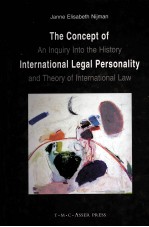图书介绍
THE CONCEPT OF INTERNATIONAL LEGAL PERSONALITY AN INQUIRY INTO THE HISTORY AND THEORY OF INTERNATIOpdf电子书版本下载

- JANNE ELISABETH NIJMAN 著
- 出版社: T.M.C.ASSER PRESS
- ISBN:9067041831
- 出版时间:2004
- 标注页数:494页
- 文件大小:30MB
- 文件页数:511页
- 主题词:
PDF下载
下载说明
THE CONCEPT OF INTERNATIONAL LEGAL PERSONALITY AN INQUIRY INTO THE HISTORY AND THEORY OF INTERNATIOPDF格式电子书版下载
下载的文件为RAR压缩包。需要使用解压软件进行解压得到PDF格式图书。建议使用BT下载工具Free Download Manager进行下载,简称FDM(免费,没有广告,支持多平台)。本站资源全部打包为BT种子。所以需要使用专业的BT下载软件进行下载。如 BitComet qBittorrent uTorrent等BT下载工具。迅雷目前由于本站不是热门资源。不推荐使用!后期资源热门了。安装了迅雷也可以迅雷进行下载!
(文件页数 要大于 标注页数,上中下等多册电子书除外)
注意:本站所有压缩包均有解压码: 点击下载压缩包解压工具
图书目录
Chapter 1 General Introduction 1
1.1.Introduction 1
1.2.Problem and Purpose 7
1.3.Method 13
1.3.1.Introduction 13
1.3.2.A contextual approach 17
1.3.3.Contextualisation of the concept of International Legal Personality 25
Chapter 2 Historical Introduction:Leibniz and the Emergence of the Concept of ILP 29
2.1.Introduction 29
2.2.The Post-1648 European Context 31
2.2.1.Restoration of communication and political modernisation in Europe 31
2.2.2.At the crossroads to modernity:rationalisation and the cosmopolis 38
2.2.3.Jurisprudential context:identifying international legal scholarship 45
2.2.3.1.Prelude-Grotius and Hobbes 45
2.2.3.2.The other German advisor-Samuel Pufendorf(1632-1694) 53
2.3.Introduction of ILP within Leibniz’Universal Jurisprudence 58
2.3.1.Political realism:the concept of relative sovereignty 60
2.3.2.Universal justice:natural law and the law of nations 68
2.3.3.Conclusions on the emergence of ILP:reconciling realism and idealisrn,sovereign and justice,and participation and responsibility 76
2.4.The 18th-Century Interlude 80
Chapter 3 Demystifying ILP:Brierly,Kelsen and Scelle 85
3.1.Introduction 85
3.2.The Contemporary Context of Interbellum Scholarship 92
3.2.1.Political context:democracy endangered 92
3.2.2.Between hope and fear:the public’s reason versus the irrationality of the masses 97
3.2.2.1.Introduction 97
3.2.2.2.The public:voice of reason 99
3.2.2.3.The irrationality of the masses:threatening democracy and individuality 101
3.2.2.4.Conclusion 109
3.2.3.Jurisprudential context 110
3.2.3.1.Introduction:the 19th-century legacy 110
3.2.3.2.The concept of ILP in Interbellum internationallegal scholarship 115
a.Restoration 116
b.Revision 122
c.Conclusion 130
3.3.James Leslie Brierly(1881-1955) 131
3.3.1.Introduction 131
3.3.2.Brierly’s concept of international law 134
3.3.3.Personality and the state:towards an anthropocentric approach 137
3.3.4.The true subjects of international law 145
3.3.5.Conclusion 148
3.4.Hans Kelsen(1881-1973) 149
3.4.1.Introduction 149
3.4.2.The Viennese context 153
3.4.2.1.Introduction 153
3.4.2.2.‘The polluted political atmosphere’ 155
3.4.2.3.Intellectual context:conceptual monsters 161
3.4.2.4.Conclusion 166
3.4.3.Kelsen’s concept of international law 167
3.4.4.Kelsen’s concept of legal personality:democracy and reduction 178
3.4.4.1.Introduction 178
3.4.4.2.Hypostatisation and reduction 179
3.4.4.3.The de-deification of the state 184
3.4.4.4.Freedom and democracy 187
3.4.5.Conclusion:Entschleierung 190
3.5.Georges Scelle(1878-1961) 192
3.5.1.Introduction 192
3.5.2.French context:the Third Republic(1870-1940) 197
3.5.2.1.The political context:l’absolutisme des gouvernants 197
3.5.2.2.Intellectual context:debating the decline of democracy and individual liberties 203
3.5.3.Scelle’s concept of international law 216
3.5.4.Scelle’s concept of ILP:defending democracy and individual liberties 225
3.5.5.Conclusion 241
3.6.Conclusion:Removing the Mask 242
Chapter 4 Cold War Bi-polarity:ILP hanging in the Balance 245
4.1.Introduction 245
4.2.Context of Cold War International Legal Scholarship 250
4.2.1.International political context:Cold War bi-polarity 250
4.2.2.Intellectual context:two responses to modern anxiety-realism and idealism 258
4.2.3.Jurisprudential context:the reinforcement of sovereignty or justice 277
4.3.Hans Morgenthau(1904-1980) 288
4.3.1.Introduction 288
4.3.2.The identification of international law-a set of static,primitive and weak legal rules-as pretext 292
4.3.3.Morgenthau’s use of ILP:impenetrability and exclusion 294
4.4.Hersch Lauterpacht(1897-1960) 297
4.4.1.Introduction 297
4.4.2.A neo-Grotian conception of international law 304
4.4.3.Federalism and the use of ILP:the sovereignty of man and justice 312
4.4.4.Conclusion 323
4.5.Myres Smith McDougal(1906-1998) 325
4.5.1.Introduction 325
4.5.2.International law as policy:authoritative decision-making processes 325
4.5.3.McDougal and ILP:beyond obsession 329
4.6.Wolfgang Friedmann (1907-1972) 334
4.6.1.Introduction 334
4.6.2.International law:co-existence and co-operation 339
4.6.3.Friedmann’s use of ILP:inclusion 340
4.7.Conclusion:a gradual process of inclusion 344
Chapter 5 The Concept of ILP Today:The End of the Subject? 347
5.1.Introduction:a new age? 347
5.2.Context of Contemporary International Legal Scholarship 354
5.2.1.Globalisation and fragmentation:‘the age of non-state actors?’ 354
5.2.2.Post-modernism and the fragmentation of the self:the end of the subject? 365
5.2.2.1.Foucault and the‘end of the subject’ 370
5.2.2.2.Saving capacity and responsibility: Ricoeur and the ethical and moral subject 378
5.2.2.3.Conclusion 386
5.3.Contemporary International Legal Scholarship:skirting round ILP? 387
5.4.Thomas Franck’s struggle with Zeus 407
5.4.1.Introduction 407
5.4.2.Franck’s concept of international law 408
5.4.3.Franck’s construction of the post post-modem self:the world citizen 416
5.4.4.Conclusion 424
5.5.Christine Chinkin:Opening up the Agora 428
5.5.1.Introduction 428
5.5.2.The sexed and gendered nature of international law 432
5.5.3.Chinkin’s use of ILP:the inclusion and empowerment of the female subject 439
5.5.4.Conclusion 442
5.6.Conclusion:has‘the loathsome mask’fallen? 444
Chapter 6 Evaluation and Conclusions:ILP and Universal Justice-From Mask to Vocal Cords 447
6.1.Introduction 447
6.2.An episodic narrative of the conceptual history of ILP 448
6.3.The concept of ILP revisited: the metaphor of the vocal cords 457
Consulted literature 475
Index 491
精品推荐
- Northanger Abbey(1818)
- Emma(1815)
- Sense And Sensibility(1811)
- Mansfield Park(1814)
- HUMANITIES THE EVOLUTION OF VALUES
- Pride And Drejudice(1812)
- English
- 企鹅经济学词典 经济学
- 大人的友情 河合隼雄谈友谊
- Computing Concepts
- Advanced Compilpr Design and lmplementation
- 中国商事法律要览
- Introduction to polymers
- CONFICT OF LAWS IN THE WESTERN SOCIALIST AND DEVELOPING COUNTRIES
- Measurement and Research Methods in International Marketing